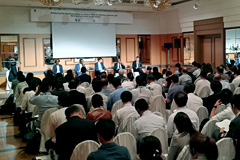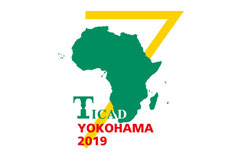Policies Discussed at a TICAD 7 Side Event to Meet Macroeconomic Stability and to Fund Development Finance Needs
2019.09.10
On Aug. 30, the JICA Research Institute organized a seminar titled “Balancing the financing needs to achieve SDGs for African countries and the fiscal and debt sustainability” as a side event at the Seventh Tokyo International Conference on African Development (TICAD7) 2019. This conference was held from Aug. 28 to 30 in the city of Yokohama in Japan.

The seminar discussions included the effectiveness of the funding and the involvement of non-traditional lenders
The debt burden of many African countries was stabilized in the 2000s thanks to debt reductions and high economic growth. However, the situation is now showing signs of deterioration in the heightened circumstances of uncertainty in the global economy and amid declining commodity prices. The structure of debt is also changing significantly because of growing obligations from non-traditional donors and commercial lenders, which add difficulty to the debt management efforts of these nations. The international community must work closely with the African countries to avoid the risk of another round of debt crises while meeting the financing needs of these nations to work toward the achievement of the SDGs.
This seminar was organized in the above context to discuss debt sustainability policies with African leaders, private enterprises, and international organizations while meeting the SDG financing needs of African nations. The seminar discussions included the effectiveness of the funding, the practical issues in the implementation of the funds, and the involvement of non-traditional lenders.
First, JICA Chief Economist Ryosuke Nakata presented the objectives of the seminar and outlined the macroeconomic view of the debt situation and the SDG financing needs in Africa. He observed that the average debt levels had recently deteriorated in Africa. However, the median interest rates of African countries did not rise substantially while the interest rates for the group of countries in the upper quintile tended to rise consistently. This situation possibly suggested the impact of borrowing from non-traditional lenders. He also observed that the accumulation of debt was not necessarily associated with a rise in the GDP growth rate for the majority of countries in Africa because, in Asia, countries with higher and lower GDP growth are almost equally distributed with regard to the accumulation of debt. He then discussed the policy recommendations compiled for fiscal and debt sustainability by the Africa taskforce at the Think20 (T20) summit. The Africa taskforce is one of the engagement groups for G20 Japan this year and he is a member of this unit.
Following Nakata’s presentation, Harinder Kohli, the chief executive officer of the Emerging Markets Forum discussed the findings of his on-going research on the lending activities of the Non-Paris Club countries (NPC) in Africa. This investigation is engaged in examining the individual projects selected and financed by the NPC in six African countries with regard to their impact on the economy as well as their development outcomes. The study is discovering that although certain positive effects are observed in the immediate short term, the impact tends to turn negative due to the lack of transparency in the selection of projects and in implementation procedures as well as the deficiency of quality. Kohli called for adherence to the G20 principles adopted in Japan this year to ensure quality infrastructure.
Subsequently, the seminar moved on to a panel discussion that included the participation of two African ministers, a Japanese private sector executive, and two international organization officials. The panel discussed the prospects of the achievement of the SDGs in Africa, the projected financing needs, and the policies of maintaining the sustainability of debt.

The panel discussed the prospects of the achievement of the SDGs in Africa, the policies of maintaining the sustainability of debt, and more
Nialé Kaba, the Planning and Development minister of Cote d’Ivoire confirmed that her country went through severe civil conflicts and is thus burdened by a significant financing gap in rectifying domestic inequality, providing education and employment for youth, and developing infrastructure in order to attract foreign direct investments. Nonetheless, she stated that the development of a national strategy to achieve the SDGs had helped to mobilize financing from domestic resources in addition to the development institutions. She also indicated that further financial mobilization from the market, the inclusion of the informal sector, and the improvement of public resource allocations through better project scrutiny were pivotal to the nation’s sustainable development.
Amadou Hott, Senegal’s minister of Economy, Planning, and International Cooperation, discussed his government’s policy of achieving the SDGs and maintaining debt sustainability. Such policies included administrative reform to move the planning of public-private-partnerships (PPP) projects under the purview of his ministry from the line ministries. This move helps in inspecting and regulating projects, in minimizing the need for public funding to the projects with direct economic returns, and in intentions to use external donor funding to leverage private sector financing.
Toshikazu Takatori, general manager of the International Economic Cooperation and the PPP Promotion Department of Sumitomo Corporation, stated that his organization had invested significantly in the resource and electricity sectors in Africa and that he considers Africa to be one of the promising investment destinations of the world. He asserted that business environment, macroeconomic stability, governance systems, and reliability in contract enforcement were the most important factors in making investment decisions. He also emphasized the importance of the formation of a proper debt management framework by the IMF, the World Bank, and the African Development Bank with the involvement of debtor and creditor countries since the debt crisis would cause difficulties in mobilizing finance for private sector businesses as well.
Dominique Desruelle, the deputy director of the African Department at the IMF strongly endorsed the objectives of this seminar and stressed the need for policies to mobilize domestic resources and to ensure the efficiency of development expenditures, debt transparency, and private sector financing. He expressed his concerns about a growing number of African countries recently being classified as high-risk according to the Debt Sustainability Analysis. He also discussed the IMF’s functioning in advancing dialogues with individual non-traditional lenders to assure the transparency of debt.
Director General Gabriel Negatu, Eastern Africa Region, African Development Bank, shared his concerns with regard to the prospect of achieving the SDGs in Africa due to the delays in resource mobilization for development purposes. He especially highlighted the need to tap international sources of financing through innovative approaches. He also elucidated that alignment to the development strategy, financial viability, development outcomes, and additional availability of financing were strategic factors in decisions to extend funding through the private sector financing window of the African Development Bank.
In concluding the discussions, the moderator for the panel discussion and JICA Vice President Mutsuya Mori summarized that the panelists presented a shared opinion about the need to balance the mobilization of development financing and the sustainability of debt and cautioned against a narrow focus on the debt sustainability issue alone. They articulated a common need to maintain debt sustainability to attract private investment also and spotlighted the requirement of cooperation among G20 countries to secure debt transparency as agreed and adopted at G20 Osaka Summit and TICAD. Mori stated that Japan, in collaboration with international organizations, would enhance its assistance to African countries in the debt management capacity and would help in the mobilization of finance for development going forward.
The panelists represented discrete perspectives and included voices that belonged to different grounds: the African countries as borrowers, private enterprises as investors, and international organizations that assist in the development strategy and in the establishment of macroeconomic policies. Nevertheless, the discussion achieved a common understanding of the policies necessary to mobilize financing including debt to achieve the SDGs without causing the macroeconomic instability. JICA will further advance its strategic engagement with African partner countries to assist in their development efforts to achieve the SDGs by 2030.


事業事前評価表(地球規模課題対応国際科学技術協力(SATREPS)).国際協力機構 地球環境部 . 防災第一チーム. 1.案件名.国 名: フィリピン共和国.

事業事前評価表(地球規模課題対応国際科学技術協力(SATREPS)).国際協力機構 地球環境部 . 防災第一チーム. 1.案件名.国 名: フィリピン共和国.

事業事前評価表(地球規模課題対応国際科学技術協力(SATREPS)).国際協力機構 地球環境部 . 防災第一チーム. 1.案件名.国 名: フィリピン共和国.

事業事前評価表(地球規模課題対応国際科学技術協力(SATREPS)).国際協力機構 地球環境部 . 防災第一チーム. 1.案件名.国 名: フィリピン共和国.

事業事前評価表(地球規模課題対応国際科学技術協力(SATREPS)).国際協力機構 地球環境部 . 防災第一チーム. 1.案件名.国 名: フィリピン共和国.
scroll